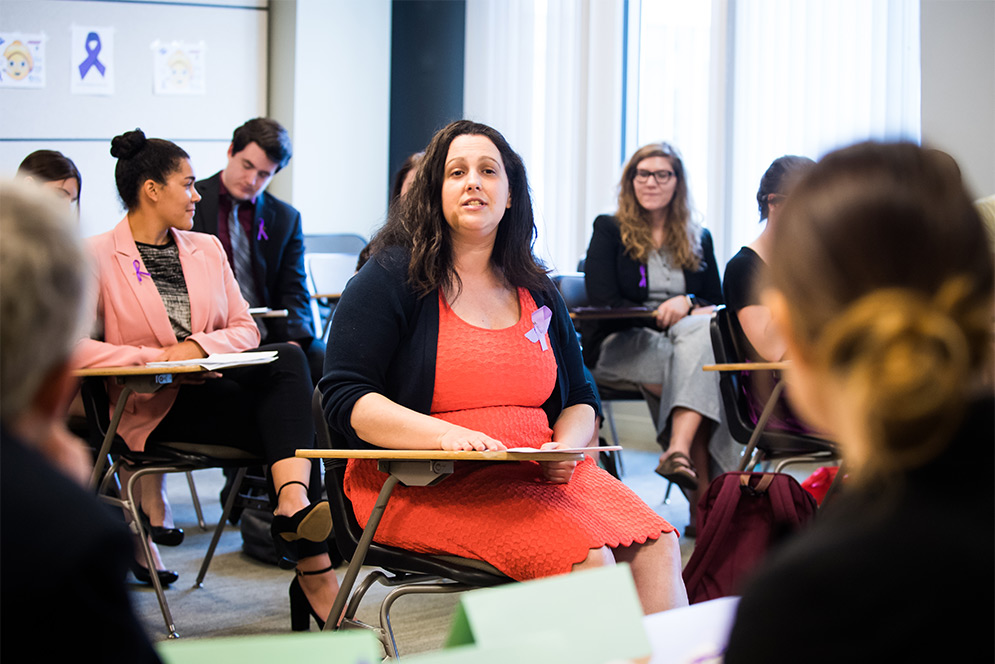In Fighting Opioids, Just the Facts Isn’t Enough
SPH class teaches effective public health communication

Senator Kirsten Gillibrand, actually Shari King (COM’98, SPH’18), “testifies” about opioid abuse during a class on effective public health advocacy.
Class by class, lecture by lecture, question asked by question answered, an education is built. This is one of a series of visits to one class, on one day, in search of those building blocks at BU.
The chairman of the Massachusetts Joint Committee on Health Care Financing welcomes a distinguished witness to the hearing table: US Senator Kirsten Gillibrand (D-N.Y.).
“I have nowhere more important to be,” she says, getting belly laughs from the crowd for what is a double entendre: yes, Gillibrand is testifying in favor of an important bill that would limit a first-time opioid patient’s prescription to seven days in Massachusetts—but, this isn’t really Gillibrand, or the joint committee.
The former is being played by Shari King (COM’98, SPH’18), and the “hearing” is the final project of her School of Public Health class Strategies for Public Health Advocacy. As a student, King doesn’t have anything more pressing at the moment.
The class is taught by Michael Siegel, an SPH professor of community health sciences. The committee members are actually SPH alumni and staff, Siegel’s 13-year-old daughter, Miriam, and as the chairman, Siegel himself (who also gets chuckles when he momentarily forgets his character’s name and must glance at his name sign).
Public health is dominated by fact-rooted disciplines like statistics and epidemiology. Yet all that science is as useless as snake oil if you can’t persuade the public and political leaders about it, Siegel says. His students spend the semester learning to find their public voice, practicing such communication skills as press releases, op-eds, and testimony for public hearings.
Gillibrand/King peppers her “testimony” with numbers—opioids accounted for 66 percent of overdose deaths in 2016—while also heeding Siegel’s teaching to put human faces on a problem by calling out two “parents” in the audience whose sons died from opioids.
Assigned the other side of the debate, Morgan McCallister (SPH’19), playing an American Medical Association representative, calls the bill a “blunt, one-size-fits-all” infringement on doctors’ prescription-writing.
Note: In real life, Massachusetts enacted the seven-day limit in 2016.
Students hurl themselves into the role-playing with gusto. Audience “supporters” of the bill rattle pill bottles to applaud their side’s speakers, prompting even Siegel to fold over and laugh.

Jessica Newman (SPH’18) says the Strategies for Public Health Advocacy class has taught her how to translate dry statistics into communication that the lay public can digest easily.
His own experience, he says in an interview, proves skilled advocacy is no laughing matter. He had a hand in reframing public attitudes toward Big Tobacco when he lobbied for smoke-free restaurant laws in California as a UC Berkeley master’s student. Opponents had beaten back the effort by labeling smoking a customer choice—“what America’s about”—until he wrote a paper on secondhand smoke’s potentially harmful health effects on restaurant workers. Reframing the issue that way, he says, broke the logjam on enacting the smoke-free laws.
Before that episode, Siegel says, he “went out into the world thinking…if I just go out there and I know the data and the science and the epidemiology, and if I just go out and educate people about how bad these various things are, they’ll do what I want.” Realizing that he needed “to teach the techniques that we used to defeat the tobacco companies,” he debuted his BU class in 2005.
“Who better to learn from than him?” given his real-world tangles with tobacco types, says Nina Levine (SPH’19, SSW’19). She’s interested in the opioid crisis particularly, and “a lot of the skills I’ve learned here have made me more passionate about more advocacy-driven work.”
Jessica Newman (SPH’18) says the communication skills Siegel teaches are just what the doctor ordered for a field whose “professionals like to speak in numbers and say ‘one out of 20,’ and the general public doesn’t really understand what that means.”
The class has a two-part takeaway, at once hopeful and cautionary. “An individual can have a huge impact on society…more than they ever imagined possible,” but to do that, students “have to understand the basic skills of advocacy,” Siegel says.
“I think that the number-one skill,” he says, “is what I call framing the issue. How do you frame the issue in a way that it resonates with people?” Fate provided a real-life lesson last year, when the entire country became a case study during the congressional debate over repealing the Affordable Care Act (ACA). Initially, Siegel says, ACA opponents had done “a really clever thing” by dubbing it Obamacare, making it “sound like this one guy is coming in and taking over” American healthcare through the government.
“Our side—supporters of the ACA—did not do a good enough job in reframing the issue,” he says, by focusing on expanding health insurance. Siegel believes it would have been cannier to argue the ACA would rescue healthcare from Big Pharma and insurance companies via regulation. He believes supporters last year fended off repeal efforts by stressing how Obamacare’s benefits—insurance despite preexisting conditions, for example—would be taken away.
“A loss is always more meaningful than a gain,” he says.
This Series
Also in
One Class, One Day
-
February 27, 2019
A Class That Explores the Gospel According to Tupac Shakur
-
December 17, 2018
Nuclear Governance Class Offers Context to Current Headlines
-
November 30, 2018
Breaking Bad Director Gives CAS Class the Inside Dope

Comments & Discussion
Boston University moderates comments to facilitate an informed, substantive, civil conversation. Abusive, profane, self-promotional, misleading, incoherent or off-topic comments will be rejected. Moderators are staffed during regular business hours (EST) and can only accept comments written in English. Statistics or facts must include a citation or a link to the citation.